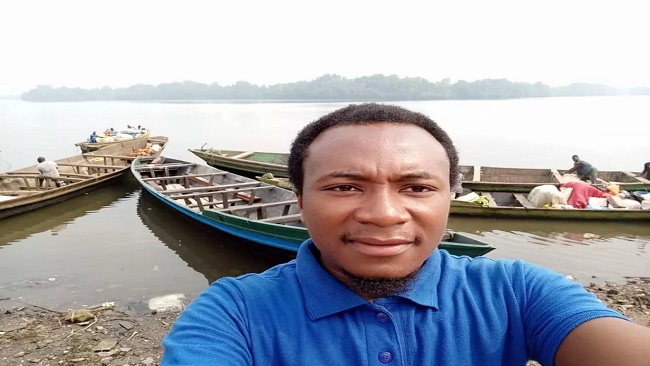On the front-line against coronavirus in Cameroon: Where many refuse to venture
Dr. Sangwe Clovis Nchinjoh steps aboard a slender wooden boat. It’s traditionally made, like an oversized wooden canoe, sealed with tar, driven by a 15-horsepower outboard motor. He squeezes in, breathing the same air as 30, maybe 40 passengers. They wear the masks the government gave them, but he wonders how many know the coronavirus is real.
It’s a long ride to work, almost three hours through brackish waters, occasional thunderstorms, webs of mangroves and 90-degree heat that conspires with humidity to feel like 100-plus. Sangwe is one of two doctors at Manoka District Hospital, which has just three nurses, one lab technician and no water or electricity.
The crowd makes him nervous. When the pandemic arrived, government officials limited the number of passengers. But now, like in so many other places, the rules have relaxed. The doctor, however, has not. The trim 28-year-old, with a thick chin beard and a youthful face hidden behind a mask, putters across the water clutching a bottle of hand sanitizer.
Sangwe treats the inhabitants of Douala VI Subdivision, 47 largely isolated islands in the delta of the Dibamba and Wouri rivers in central Africa. Douala is the business capitol of Cameroon, but VI Subdivision is sparsely populated — just 5,464 people, as of 2005.
He is still waiting for COVID-19 to reach his hospital. There have been more than 2,500 cases in Cameroon, a country of 25 million on the Gulf of Guinea, similar in size to Spain or Sweden. Just over 100 have died from it. It’s a matter of time.
He was trained for an outbreak. He learned how the virus is transmitted and how to prevent it, how to respond to a suspected case, conduct a clinical evaluation, and use protective gear. But he learned little to help him convince the people to trust him.
On these rural islands, it’s not easy to stay 6 feet apart or wash your hands all the time. Some of these are communal cultures, he explains, where people share dishes and rely on interaction to sustain themselves. “And we’re not just talking about relatives in the same house,” he clarifies. “We’re talking about neighbors.”
But he tries. He went to medical school at the University of Buea to help places like this — like the one where he grew up. And he founded a nonprofit called Rural Doctors, which relies on a network of doctors to deliver care across the country.
They used to focus on treating refugees of the Anglophone Crisis — a war of independence waged by Ambazonian separatists — which has killed more than 3,000 people and displaced hundreds of thousands since 2017. The pandemic changed that. “It’s completely redefined our approach to everything,” Sangwe says.
Since April, Rural Doctors has visited six villages in the embattled northwest, where many, Sangwe says, refuse to venture. They stay for two to four days, warning people about the pandemic, building hand-washing facilities and teaching them to make masks, doing their best to enlist the locals. “We cannot create a solution to someone’s problem without that person involved,” he says. “It will never work.”
But war demands your attention. The virus is invisible. They have to trust him.
As Sangwe glides over the water, he wonders if he’ll be the one to bring the virus out here. He stays in a two-bedroom apartment, provided by the hospital, with a generator so he can watch African cinema, and drinks bottled water delivered on these same boats. If it does get here, it will be hard for him to avoid.
He worries more about taking it home to Douala, to his wife and their kids, aged 2 and 3. Some people on the boat take their masks off when it gets too hot or they’re trying to talk. Even with the masks, the passengers are too close, sometimes close enough to share sweat. Mostly, he’s afraid they don’t want his help.
“Going through the training, knowing what is actually supposed to be done,” he says, “and then you move out and you see people not observing it, not even believing it exists — it’s a bitter pill to swallow.”
Source: deseret.com





